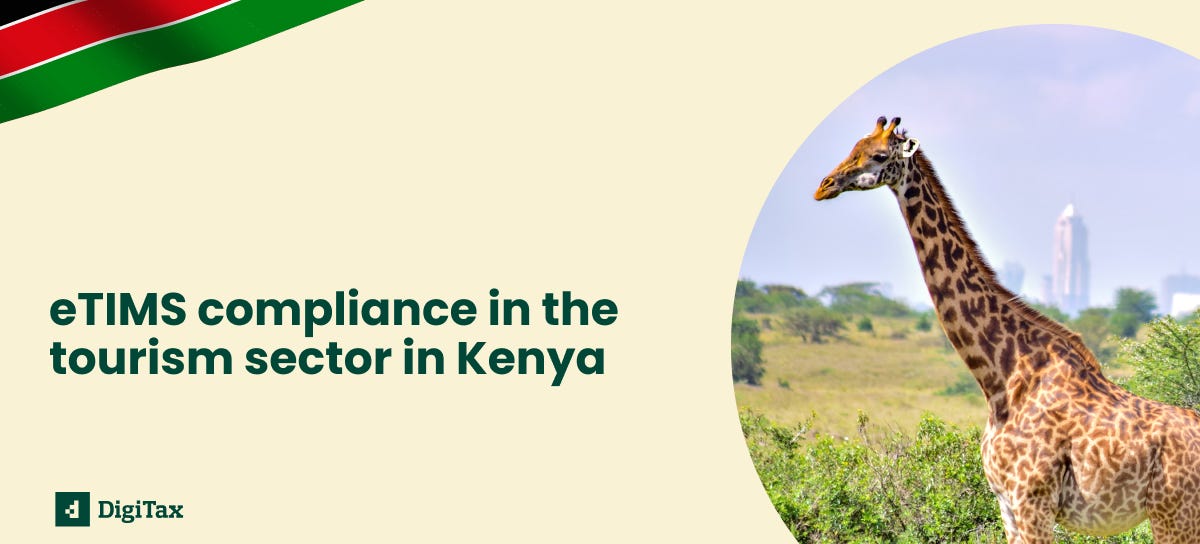The Travel and Tourism Sectors in Kenya and eTIMS Compliance
Background
Kenya’s travel and tourism sector plays a critical role in economic growth, foreign exchange earnings, and job creation. Kenya is globally renowned for its diverse attractions, ranging from world-class wildlife safaris and pristine beaches to rich cultural heritage and scenic landscapes. The sector continues to expand, driven by both domestic and international tourism, as well as improved infrastructure and marketing efforts.
As the sector expands, compliance with tax obligations, particularly under the Electronic Tax Invoice Management System (eTIMS) has become critical in ensuring transparency, safeguarding revenue, and supporting sustainable growth.
Key Stakeholders in this sector
The key stakeholders in the sector include government institutions, hotels and accommodation providers, tour operators and travel agents, airlines, domestic and international tourists, tour guides, and transport companies.
Each plays a distinct role in shaping the industry and is impacted differently by eTIMS compliance.
eTIMS Requirements
Under the Income Tax Act and the Tax Procedures Act, all taxpayers must:
1. issue eTIMS compliant invoices; and
2. ensure they have eTIMS-compliant expenses
In addition, where a supplier has an annual turnover of less than KES 5 million, the purchaser is required to issue a reverse invoice through the eTIMS platform.
However, certain transactions, remain exempt, including emoluments, imports, investment allowances, internal accounting adjustments, airline passenger ticketing, and interest and fees charged by financial institutions.
Implications for Industry Players
Hotels and Accommodation Providers
Hotels, tour operators, and travel agents are required to issue eTIMS-compliant invoices to customers and ensure that all their expenses are supported by compliant invoices. Where they deal with suppliers whose turnover is below KES 5 million, they must generate reverse invoices on the suppliers’ behalf. This ensures that all transactions, whether income or expenditure, are captured within the eTIMS system.
Airlines
Airlines are exempt from issuing eTIMS invoices for passenger ticketing.
Transport Companies
Transport providers engaged in tourism services must issue eTIMS-compliant invoices for services rendered and ensure that expenses are supported with compliant documentation.
Government and Regulators
Government agencies need to ensure that they issue eTIMS compliant invoices. In addition, consumers of the government services who wish to claim these fees as an expense will need to ensure they receive eTIMS complaint invoices from the respective government entity.
Compliance Steps
To comply with Kenya’s eTIMS regulations, businesses in the travel and tourism sector should follow these steps:
1. Identify Relevant Transactions
o Determine which services or transactions require eTIMS-compliant invoicing.
o Note exemptions such as airline passenger ticketing and financial institution charges.
2. Choose an eTIMS Integration Method
Businesses can comply using one of three options:o Direct Integration via API: Suitable for larger hotels, airlines, and tour operators with in-house IT capacity.
o Approved Service Providers: Outsource compliance through certified intermediaries such as DigiTax.
o Onboard to eTIMS: Register your business on the eTIMS platform by submitting your business details, KRA PIN, and preferred method of compliance. This step activates your access to the system and ensures that all future invoices issued are recognized as authentic and compliant by the Kenya Revenue Authority.
3. Issue and Validate eTIMS Invoices
o Once registered, issue eTIMS-compliant invoices for all taxable transactions.
o Where dealing with suppliers below the KES 5 million threshold, generate reverse invoices to ensure proper expense recognition.
4. Maintain Accurate Records
o Ensure that all income and expense invoices are stored, reconciled, and reported through eTIMS to remain compliant.
DigiTax’s Solution
DigiTax simplifies eTIMS compliance for businesses in Kenya’s travel and tourism sector by offering a tailored, end-to-end solution:
· Seamless Onboarding: Get started quickly without lengthy integrations. Our dashboard ensures you remain compliant while your systems are being set up.
· Unified Dashboard: Manage all eTIMS invoices; income, expense, and reverse invoices in one central platform.
· API, Manual and Bulk Upload Options: Whether you’re a large hotel with complex IT systems or a small tour operator, DigiTax supports automated integration with 50+ accounting systems including Quickbooks, Odoo, Woocommerce, Sage, Oracle, Microsoft Dynamics among others as well as both manual and bulk upload.
· Reverse Invoice Automation: Automatically generate reverse invoices for suppliers under the KES 5 million threshold, reducing errors and administrative burden.
· Real-Time Compliance Monitoring: Track the status of invoices, spot discrepancies early, and stay audit-ready with the report feature.
· Scalable for All Players: From boutique lodges to multinational airlines, DigiTax adapts to the size and complexity of your operations.
By partnering with DigiTax, tourism stakeholders can focus on delivering exceptional experiences while remaining fully compliant with Kenya Revenue Authority’s eTIMS requirements.
Conclusion
In conclusion, while eTIMS compliance introduces additional administrative obligations across the travel and tourism industry, it also enhances transparency, broadens the tax base, and strengthens Kenya’s fiscal position. Stakeholders who embrace compliance early will not only avoid penalties but also position themselves as trusted players in a highly competitive sector.


